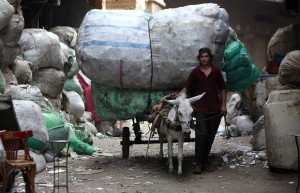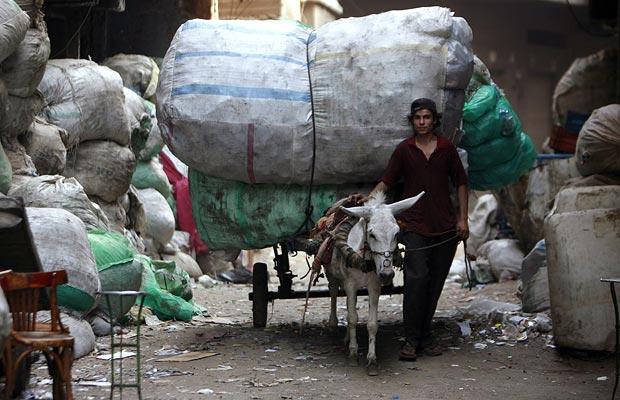
(AFP Photo)
Poverty rates, inflation, unemployment, food scarcity, and social unrest are on the rise and the government is not only failing to combat it but in some cases is contributing to it, the Egyptian Centre for Economic and Social Rights argues in a report.
Ahead of the review of Egypt’s periodic report by the Pre-Sessional Working Group of the United Nations Committee on Economic, Social and Cultural Rights (CESCR), the centre released its report detailing the main economic and social problems facing Egypt following the 25 January 2011 uprising.
The CESCR, a committee within the UN Office of the High Commissioner for Human Rights (OHCHR), is reviewing Egypt’s compliance with its obligations under the International Covenant on Economic, Social and Cultural Rights (ICESCR).
Poverty rates increased from 16.7% in 2000 to 21.6% in 2009 and increased further to 25.2% in 2011, the report demonstrates. Over 40% of the population lives below the poverty line (less than $2 a day) yet 2% of the population controls 98% of the economy, demonstrating a huge discrepancy.
Inflation is also on the rise, 6.6% since January 2012, due to increasing prices of commodities like eggs, dairy products, and textiles as well as increases in electricity prices (due to fuel shortages) and housing maintenance and repairs.
Unemployment among women is as high as 24% in according to figures from the Central Agency for Public Mobilisation and Statistics (CAPMAS), compared to 9% among men. Overall unemployment has increased from 9% in 2010 to 12% in 2011 and 12.8% in 2012. Meanwhile, youth unemployment (ages 20 to 24) is currently at 33%.
The ECESR report also cites the Egyptian Food Observatory, which said that 86% of vulnerable households were unable to secure their food needs at the end of 2012. The observatory also reports that 61.7% of vulnerable households spend their income on food whereas the national average is 40%.
All of these factors, in combination with the uprising, have led to an increase in social demonstrations and protests. As demonstrated in an earlier ECESR report, Egypt saw 3,817 protests related to labour, social and economic issues, more than double the amount of protests in 2010.
The report was critical of President Mohamed Morsi and his government as well as the several transitional governments in power under the rule of the Supreme Council of the Armed Forces (SCAF), focusing its criticism on legislative and constitutional issues.
Law 4 of 2012, passed by SCAF, empowers the General Authority for Investment and Free Zones to settle with investors charged with corruption outside of court as long as they return “impugned money or goods, or else pay compensation equivalent to the market value of the unlawfully acquired property at the time the crime was committed” without standing trial.
“This law destroyed all efforts to end impunity for corruption, one of Egypt’s major problems. The constant shift of legislative powers has made it impossible to repeal this law, and has not given the chance for civil society and anti-corruption activists to pressure the legislature to repeal this law,” the report stated.
ECESR heavily criticised Law 34 of 2011 that bans strikes, sit-ins, and protests, calling it “the most significant example of an unlawful limitation of rights through legislation”.
The law, also passed by SCAF, “criminalises striking, protesting at work, calling for strikes or taking part in strike movement, or any ‘activity’ that can delay or stop work” and according to the report “clearly violates the rights to strike and to protest, which were granted by international agreements”.
The report is also critical of the 2012 constitution that passed at the end of the year, saying it “adversely affected” the state of human rights in the country and focuses specifically on children’s rights in relation to child labour laws (the new constitution allows children to start working at 15) and the freedom to organise for workers and other dissatisfied groups.
The report also goes into other social and economic rights violations such as the increasing privatisation of healthcare and subsequent lack of access to it most Egyptians are experiencing.
It also tackles education, water and sanitation, housing (15 million Egyptians live in slums) as well as individual cases in addition to stressing on how the new constitution contains loopholes that allow Egypt to not adhere to the ICESCR despite being a signatory.





